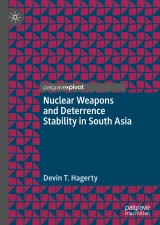Details

Nuclear Weapons and Deterrence Stability in South Asia
|
69,54 € |
|
| Verlag: | Palgrave Pivot |
| Format: | |
| Veröffentl.: | 22.06.2019 |
| ISBN/EAN: | 9783030213985 |
| Sprache: | englisch |
Dieses eBook enthält ein Wasserzeichen.
Beschreibungen
<p>This book examines the theory and practice of nuclear deterrence between India and Pakistan, two highly antagonistic South Asian neighbors who recently moved into their third decade of overt nuclear weaponization. It assesses the stability of Indo-Pakistani nuclear deterrence and argues that, while deterrence dampens the likelihood of escalation to conventional—and possibly nuclear—war, the chronically embittered relations between New Delhi and Islamabad mean that deterrence failure resulting in major warfare cannot be ruled out. Through an empirical examination of the effects of nuclear weapons during five crises between India and Pakistan since 1998, as well as a discussion of the theoretical logic of Indo-Pakistani nuclear deterrence, the book offers suggestions for enhancing deterrence stability between these two countries.<br></p><br>
<div>1 Introduction.- 2 India-Pakistan Crises, 1999-2016.- 3 Explaining Indian Moderation During Crises, 1999-2016.- 4 Deterrence Stability in South Asia Today.- 5 Enhancing India-Pakistan Deterrence Stability.</div>
<b>Devin T. Hagerty</b> is Professor of Political Science at the University of Maryland, Baltimore County, USA.
<p>“This is a carefully argued, empirically sound and theoretically deft analysis of deterrence stability and its limits in South Asia. It provides appropriate details about the diplomatic and strategic postures of both India and Pakistan, and it discusses possible pathways for enhancing deterrence stability in the region.”</p>
<p>—<b>Sumit Ganguly</b>, Distinguished Professor of Political Science, Rabindranath Tagore Chair in Indian Cultures and Civilizations, Indiana University, Bloomington, USA</p>
<p> </p>
<p>“In this compact volume, Devin Hagerty provides a multi-layered account that is both theoretically informed and empirically grounded. It will be essential reading for students, scholars, and practitioners interested in understanding the South Asian security environment and deterrence more generally.”</p>
<p>—<b>S. Paul Kapur</b>, Professor, Department of National Security Affairs, Naval Postgraduate School, USA</p>
<p> </p>
<p>This book examines the theory andpractice of nuclear deterrence between India and Pakistan, two highly antagonistic South Asian neighbors who recently moved into their third decade of overt nuclear weaponization. It assesses the stability of Indo-Pakistani nuclear deterrence and argues that, while deterrence dampens the likelihood of escalation to conventional—and possibly nuclear—war, the chronically embittered relations between New Delhi and Islamabad mean that deterrence failure resulting in major warfare cannot be ruled out. Through an empirical examination of the effects of nuclear weapons during five crises between India and Pakistan since 1998, as well as a discussion of the theoretical logic of Indo-Pakistani nuclear deterrence, the book offers suggestions for enhancing deterrence stability between these two countries.</p>
<p> </p>
<b>Devin T. Hagerty</b> is Professor of Political Science at the University of Maryland, Baltimore County, USA.
<p>—<b>Sumit Ganguly</b>, Distinguished Professor of Political Science, Rabindranath Tagore Chair in Indian Cultures and Civilizations, Indiana University, Bloomington, USA</p>
<p> </p>
<p>“In this compact volume, Devin Hagerty provides a multi-layered account that is both theoretically informed and empirically grounded. It will be essential reading for students, scholars, and practitioners interested in understanding the South Asian security environment and deterrence more generally.”</p>
<p>—<b>S. Paul Kapur</b>, Professor, Department of National Security Affairs, Naval Postgraduate School, USA</p>
<p> </p>
<p>This book examines the theory andpractice of nuclear deterrence between India and Pakistan, two highly antagonistic South Asian neighbors who recently moved into their third decade of overt nuclear weaponization. It assesses the stability of Indo-Pakistani nuclear deterrence and argues that, while deterrence dampens the likelihood of escalation to conventional—and possibly nuclear—war, the chronically embittered relations between New Delhi and Islamabad mean that deterrence failure resulting in major warfare cannot be ruled out. Through an empirical examination of the effects of nuclear weapons during five crises between India and Pakistan since 1998, as well as a discussion of the theoretical logic of Indo-Pakistani nuclear deterrence, the book offers suggestions for enhancing deterrence stability between these two countries.</p>
<p> </p>
<b>Devin T. Hagerty</b> is Professor of Political Science at the University of Maryland, Baltimore County, USA.
Addresses how and why four India-Pakistan conflicts in the last two decades have been resolved without major war or use of nuclear weapons, and whether this "ugly stability" will continue Develops realistic policy options for enhancing deterrence stability between India and Pakistan Combines comparative empirical analysis of recent crisis behavior with theoretically-driven analysis of South Asian deterrence stability
Diese Produkte könnten Sie auch interessieren:

Consejos no solicitados sobre política internacional

von: Juan Gabriel Tokatlian, Hinde Pomeraniec

9,99 €
















